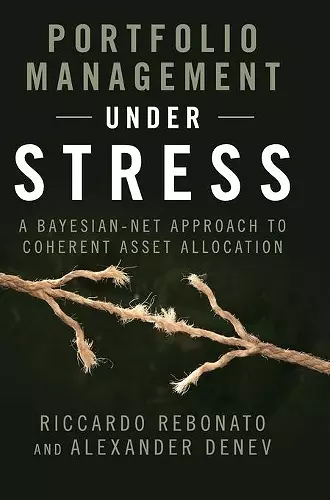Portfolio Management under Stress
A Bayesian-Net Approach to Coherent Asset Allocation
Riccardo Rebonato author Alexander Denev author
Format:Hardback
Publisher:Cambridge University Press
Published:9th Jan '14
Currently unavailable, and unfortunately no date known when it will be back

A rigorous presentation of a novel methodology for asset allocation in financial portfolios under conditions of market distress.
Portfolio Management under Stress combines the insights of modern portfolio theory with the well-established Bayesian-net methodology to offer a novel solution to the important problem of asset allocation under conditions of market distress. This insightful book is an important resource for practitioners and research academics in the post-financial crisis world.Portfolio Management under Stress offers a novel way to apply the well-established Bayesian-net methodology to the important problem of asset allocation under conditions of market distress or, more generally, when an investor believes that a particular scenario (such as the break-up of the Euro) may occur. Employing a coherent and thorough approach, it provides practical guidance on how best to choose an optimal and stable asset allocation in the presence of user specified scenarios or 'stress conditions'. The authors place causal explanations, rather than association-based measures such as correlations, at the core of their argument, and insights from the theory of choice under ambiguity aversion are invoked to obtain stable allocations results. Step-by-step design guidelines are included to allow readers to grasp the full implementation of the approach, and case studies provide clarification. This insightful book is a key resource for practitioners and research academics in the post-financial crisis world.
'Rebonato and Denev have demolished the status quo with their radical extension of best-practice portfolio management. The key is to integrate realistic 'extreme' scenarios into risk assessment, and they show how to use Bayesian networks to characterize precisely those scenarios. The book is rigorous yet completely practical, and reading it is a pleasure, with the 'Rebonato touch' evident throughout.' Francis X. Diebold, Paul F. and Warren S. Miller Professor of Economics, and Professor of Finance and Statistics, University of Pennsylvania
'Standard portfolio theory has been shown by recent events to have two major shortcomings: it does not deal well with extreme events and it is often based on mechanical statistical procedures rather than modelling of fundamental causal mechanisms. In this book, Rebonato and Denev put forward an interesting approach for dealing with both of these problems. Their method is flexible enough to accommodate individual views of underlying causal mechanisms, but disciplined enough to ensure that decisions do not ignore the data. Anyone with a serious interest in making good portfolio decisions or measuring risk will benefit from reading this book.' Ian Cooper, London Business School
'This book is self-contained in that it covers a lot of familiar but diverse material from a fresh perspective. Its purpose is to take an ambitious new approach to combining this material into a coherent whole. The result is a new methodology for practical portfolio management based on Bayesian nets, which satisfactorily takes into simultaneous account both normal and extreme market conditions. While readers may themselves be under stress in absorbing the details of the new approach, serious fund managers and finance academics will ignore it at their peril.' M. A. H. Dempster, Emeritus Professor, University of Cambridge, and Cambridge Systems Associates Limited
'Here is a book that combines the soundest of theoretical foundations with the clearest practical mindset. This is a rare achievement, delivered by two renowned masters of the craft, true practitioners with an academic mind. Bayesian nets provide a flexible framework to tackle decision making under uncertainty in a post-crisis world. Modeling observations according to causation links, as opposed to mere association, introduces a structure that allows the user to understand risk, as opposed to just measure it. The ability to define scenarios, incorporate subjective views, model exceptional events, etc., in a rigorous manner is extremely satisfactory. I particularly liked the use of concentration constraints, because history shows that high concentration with low risk can be more devastating than low concentration with high risk. I expect fellow readers to enjoy this work immensely, and monetize on the knowledge it contains.' Marcos Lopez de Prado, Research Fellow, Harvard University, and Head of Quantitative Trading, Hess Energy Trading Company
'In a recent book of my own I bemoan rampant 'confusion' among academics as well as practitioners of modern financial theory and practice. I am delighted to say that the authors of Portfolio Management Under Stress are not confused. It is heart-warming to find such clarity of thought among those with positions of great influence and responsibility.' Harry M. Markowitz, Nobel Laureate, Economics 1990
'Rebonato and Denev have ploughed for all of us the vast field of applications of Bayesian nets to quantitative risk and portfolio management, leaving absolutely no stone unturned.' Attilio Meucci, Chief Risk Officer at Kohlberg Kravis Roberts (KKR)
ISBN: 9781107048119
Dimensions: 244mm x 170mm x 29mm
Weight: 1070g
518 pages